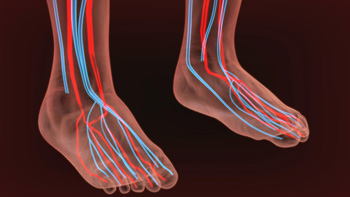 When poor circulation, or reduced blood flow affects your lower limbs, you may notice your feet feeling cold or numb and your skin turning red, blue, purple, or white. You may also notice dry skin, hair loss on the legs or feet, weakened toenails, and slow wound healing. There are many possible causes for poor circulation in the feet. Both Raynaud’s disease and acrocyanosis cause blood vessels in the extremities to constrict, leading to reduced blood flow and the affected area becoming cold, numb, and discolored. Diabetes damages the blood vessels, affecting circulation. Arteriosclerosis, in which the arteries harden due to plaque buildup, and peripheral artery disease, which occurs when arteriosclerosis progresses without treatment, are also very common culprits of impaired blood flow to the feet. If you have the symptoms of poor circulation in your feet, it is suggested that you seek the care of a podiatrist.
When poor circulation, or reduced blood flow affects your lower limbs, you may notice your feet feeling cold or numb and your skin turning red, blue, purple, or white. You may also notice dry skin, hair loss on the legs or feet, weakened toenails, and slow wound healing. There are many possible causes for poor circulation in the feet. Both Raynaud’s disease and acrocyanosis cause blood vessels in the extremities to constrict, leading to reduced blood flow and the affected area becoming cold, numb, and discolored. Diabetes damages the blood vessels, affecting circulation. Arteriosclerosis, in which the arteries harden due to plaque buildup, and peripheral artery disease, which occurs when arteriosclerosis progresses without treatment, are also very common culprits of impaired blood flow to the feet. If you have the symptoms of poor circulation in your feet, it is suggested that you seek the care of a podiatrist.
Poor circulation is a serious condition and needs immediate medical attention. If you have any concerns with poor circulation in your feet contact Dr. Richard DiMario of Maine. Our doctor will treat your foot and ankle needs.
Poor Circulation in the Feet
Poor blood circulation in the feet and legs is can be caused by peripheral artery disease (PAD), which is the result of a buildup of plaque in the arteries.
Plaque buildup or atherosclerosis results from excess calcium and cholesterol in the bloodstream. This can restrict the amount of blood which can flow through the arteries. Poor blood circulation in the feet and legs are sometimes caused by inflammation in the blood vessels, known as vasculitis.
Causes
Lack of oxygen and oxygen from poor blood circulation restricts muscle growth and development. It can also cause:
Those who have diabetes or smoke are at greatest risk for poor circulation, as are those who are over 50. If you have poor circulation in the feet and legs it may be caused by PAD and is important to make changes to your lifestyle in order to reduce risk of getting a heart attack or stroke. Exercise and maintaining a healthy lifestyle will dramatically improve conditions.
As always, see a podiatrist as he or she will assist in finding a regimen that suits you. A podiatrist can also prescribe you any needed medication.
If you have any questions please feel free to contact our office located in York, ME . We offer the newest diagnostic and treatment technologies for all your foot and ankle needs.